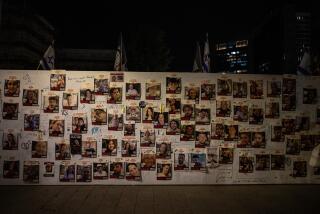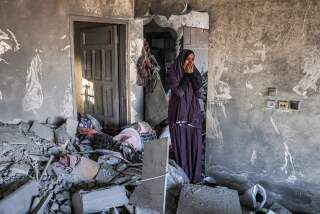Radical Islam’s unlikely soul mate
- Share via
Can jihad be redeemed? That is, can the religious and moral sense of purpose that often fuels Islamic extremism be leavened with a commitment to reason and peace, and can it be done without opening the door to gradual secularization? It’s the
$64,000 question facing Islam, and it is, for the most part, one that only Muslims can answer.
One could make the case, however, that if anyone in the West can help, it’s Pope Benedict XVI, despite the firestorm unleashed by his Sept. 12 comments on Islam. Benedict is the lone figure of global standing in the West who speaks from within the same thought-world that many Muslims sympathetic to the jihadists inhabit.
Benedict XVI will visit Turkey this week, his first trip to a majority Muslim state. And given the furor following his quotation of a 14th century Byzantine emperor that Muhammad brought “things only evil and inhuman,” the pope will certainly have the Islamic world’s attention. Much may ride on what he does with it.
A detour into the recent history of Islamic thought illustrates the potential for common ground.
Egyptian poet and essayist Sayyid Qutb, hanged by Gamal Abdel Nasser in 1966, is the father of modern Islamic radicalism. He spent 1948-50 in the United States attending Wilson Teachers College, the Colorado State College of Education (today the University of Northern Colorado) and Stanford University as part of an exchange program. Based on that experience, Qutb penned his famous tract, “The America I Have Seen,” which still exercises a profound effect in shaping Muslim perceptions of American culture.
The work amounted to a ferocious attack on what Qutb called “the American man,” depicted as obsessed with technology but virtually a barbarian in the realm of spirituality and human values. American society, for Qutb, was “rotten and ill” to its very core.
He wrote: “This great America: What is it worth in the scale of human values? And what does it add to the moral account of humanity? And, by the journey’s end, what will its contribution be? I fear that a balance may not exist between America’s material greatness and the quality of its people. And I fear that the wheel of life will have turned and the book of life will have closed and America will have added nothing, or next to nothing, to the account of morals that distinguishes man from object, and indeed, mankind from animals.”
A particular zone of disgust for Qutb was what he saw as the sexual licentiousness of American culture (and this, bear in mind, was the early 1950s). He wrote that a society in which “immoral teachings and poisonous intentions are rampant” and in which sex is considered “outside the sphere of morality” is one in which “the humanity of man can hardly find a place to develop.” Qutb said that “providing full opportunities for the development and perfection of human characteristics requires strong safeguards for the peace and stability of the family.”
In general, Qutb’s writing simmers with an outrage and extremism that no one would associate with the Old World, cerebral style of Joseph Ratzinger, now Benedict XVI. Yet for anyone familiar with Ratzinger’s cultural criticism over the years, there is nevertheless something strikingly familiar in Qutb’s polemic -- not so much with regard to America as with the West in general. What both figures share is a conviction that the West’s cult of technology has produced a deep spiritual and moral crisis.
In his 1990 book, “In the Beginning,” on the doctrine of creation, Ratzinger wrote of Western society: “The good and the moral no longer count, it seems, but only what one can do. The measure of a human being is what he can do, and not what he is, not what is good or bad. What he can do, he may do.... And that means that he is destroying himself and the world.... [The question] ‘What can we do?’ will be false and pernicious while we refrain from asking, ‘Who are we?’ The question of being and the question of our hopes are inseparable.”
Ratzinger has even linked this argument to the question of birth control, saying that contraception is merely a mechanical solution to an ethical and cultural problem. In his 1997 book, “Salt of the Earth,” he said: “One of our great perils [is] that we want to master the human condition with technology, that we have forgotten that there are primordial human problems that are not susceptible to technological solutions, but that demand a certain lifestyle and certain life decisions.” Benedict XVI would thus find in Qutb a version -- admittedly in a sometimes irrational form -- of his own critique of the West.
This is the most compelling reason why Benedict’s repeated insistence that he wants a “frank and sincere” dialogue with Islam is more than lip service. Fundamentally, the clash of cultures Benedict sees in the world today is not between Islam and the West but between belief and unbelief -- between a culture that grounds itself in God and religious belief and a culture that lives etsi Deus non daretur, “as if God does not exist.” In that struggle, Benedict has long said, Muslims are natural allies.
Recently, for example, the Vatican vigorously protested a gay pride march in Jerusalem, arguing that such an event is “offensive to the great majority of Jews, Muslims and Christians.” It’s a classic example of an issue around which Benedict believes engagement with Muslims is possible.
Yet Benedict is also well aware that Islamic radicalism tends to discredit religious commitment in any form by associating it with violence and fanaticism. Hence, when Benedict presses Muslims to reject terrorism and to embrace religious liberty, he believes himself to be doing so not as a xenophobe or a crusader but as a friend of Islam, pressing it to realize the best version of itself.
That, no doubt, will be part of the argument he tries to make in Turkey.
If they could set aside their prejudices, at least some of the spiritual sons and daughters of Sayyid Qutb might well recognize a potential ally in Joseph Ratzinger -- and therein lies perhaps the last, best hope for Muslim-Christian dialogue under Benedict XVI.
More to Read
Sign up for Essential California
The most important California stories and recommendations in your inbox every morning.
You may occasionally receive promotional content from the Los Angeles Times.










